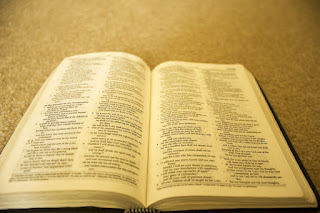I have a confession to make. A few years ago, I nearly became somewhat of a Hyper-Calvinist. Now I don't know if I would have gone all the way with it and denied the necessity of the universal gospel call, or that all Arminians are among the reprobate, but I was well on my way to at least one distinct Hyper-Calvinist doctrine; namely that God hates the finally reprobate. Basically, I was starting to believe that there were people in the world that God had absolutely nothing but hate and loathing for.
Thankfully, I no longer believe that. Please do not misunderstand me, I am still a supralapsarian High Calvinist. I do believe in double predestination, though I am not sure how I feel about equal ultimacy. On the other hand (said Christian mentally mimicking Topol from Fiddler on the Roof), I actually do think it is possible for God to elect some to life and some to eternal death and still maintain a certain kind of love for all mankind.
Put briefly, it was Genesis 1:26 and the doctrine of the image of God in the creation of man that led me to understand God's universal love for all mankind. Genesis 1:26 reads as follows:
Then God said, “Let Us make man in Our image, according to Our likeness; let them have dominion over the fish of the sea, over the birds of the air, and over the cattle, over all the earth and over every creeping thing that creeps on the earth.” NKJV
I came across this Scripture and its application to this issue by going through part of a teaching by Vineyard pastor Bill Jackson called "Nothins Gonna Stop It" [sic]. Borrowing partially from Daniel Fuller's work The Unity of the Bible: Unfolding God's Plan for Humanity, Jackson posits that God created Man, male and female, in order to reflect Him back to Himself. As I reflected on this, it became reasonable to me to assume that human beings, in the garden, looked like God, acted like God, and did many of the things that God Himself did. God has dominion. God gave Man dominion over creation. God creates. Man is endowed by God to be creative. That, to me anyway, explains the Arts and entrepreneurship - creating something that did not exist before. Marriage is an expression of the image of God in that a man enters into a covenant with his wife just as God covenants with His people - the Church.
Of course, the fall into sin has marred that image, but has not completely destroyed it. This explains why murder is such a serious - in fact, capital - offense (Genesis 9:5,6). To murder a human being is to literally deface the image of God and pour contempt on it. In a similar vein, for God to actually "hate" a sinful human being, He would actually be hating Himself.
So what of some of the Psalms that declare that God does, in fact, "hate" evildoers (Psalm 5:5; 11:5)? I don't have a complete answer for that other than to suggest possibly poetic embellishment. Imprecations in the Psalms have long vexed interpreters. Only God knows, but maybe there are rare cases of God actually hating someone (like David's enemies, who would typologically represent Christ's enemies). But even if so, I suspect these would be exceptions rather than the rule.
In short, even the most sinful and evil person bears the divine image and redemption is largely for the purpose of restoring that fallen image to Mankind so that we will again reflect God perfectly back to Himself. To summarize then, I believe that God has a general love for all people everywhere (because of the image of God in them), and a stronger, covenant love for His elect whom He chose to give to the Son of God before time began (John 17:1,2); those to whom God has sovereignly and unconditionally chosen to be the recipients of the restored image.
Subscribe to:
Post Comments (Atom)
Doctrine of the Bible, Part 1: Revelation and Inspiration
For Christians, particularly those of an Evangelical Protestant persuasion, the Bible stands unique and alone as the only rule for faith and...

-
Many Christian people do not like the biblical teachings on predestination and sovereign election, or Calvinism for short if you prefer. But...
-
The doctrine of water baptism has sadly been a bitter source of division for Christians down through the centuries, especially since the tim...
-
What is the gospel? I cannot imagine a more important question than this. As Christians, we are convinced that the gospel is the good news o...
%20(1).png)

No comments:
Post a Comment